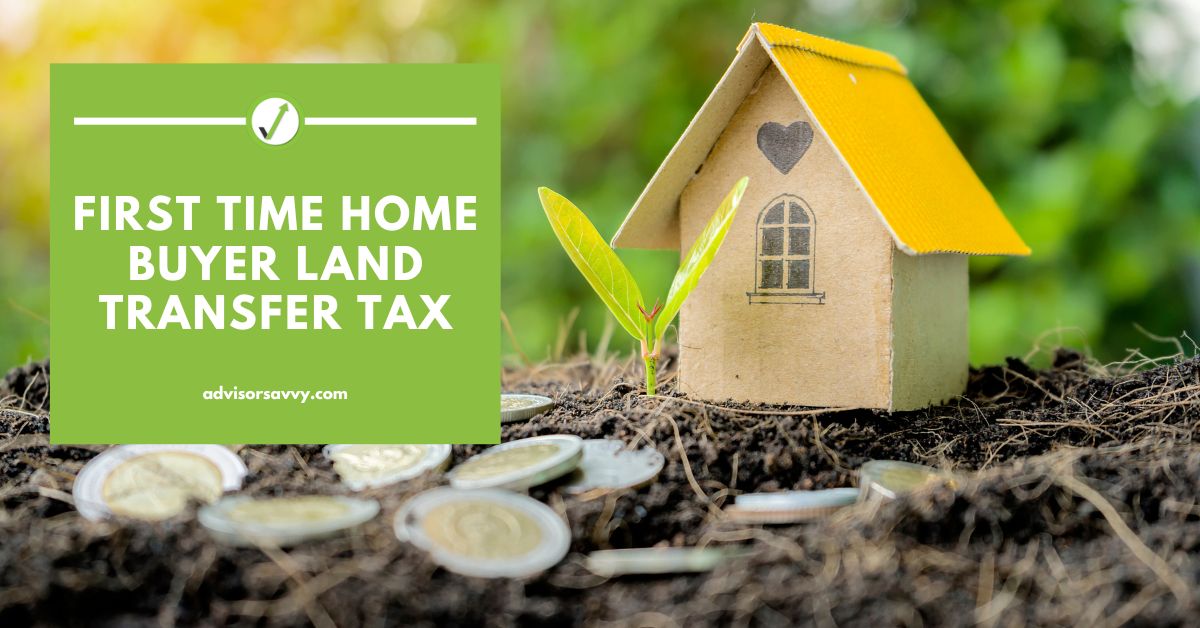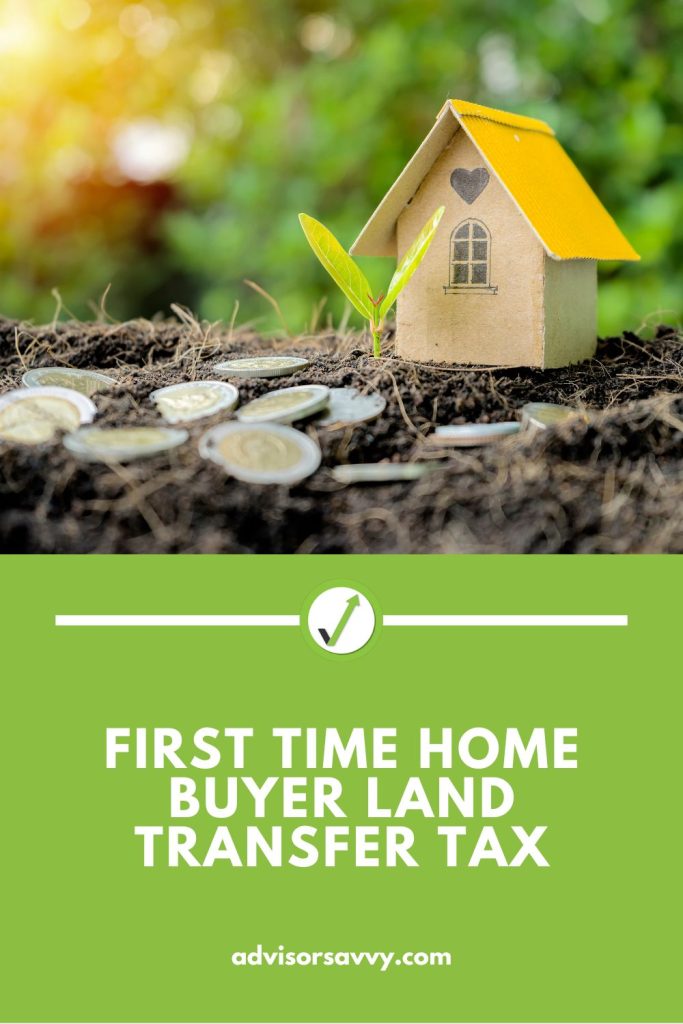
Ready to buy your first home? You’re probably saving for all your countless expenses, like closing costs, mortgage interest, and of course, your down payment. Advisorsavvy’s roster of vetted financial advisors helps hundreds of Canadians find sustainable ways to save for milestones like their first home. One hefty chunk of your closing costs is land transfer tax. But first-time home buyer land transfer tax works a little different than the norm. We’ll walk you through everything you need to know about land transfer tax. Plus, amounts first-time home buyers are eligible to receive in tax returns. Continue reading to learn more!

Table of contents
What is land transfer tax?
Land transfer tax is required either to a province or municipality upon the sale or transfer of a home from one person to another. It must be paid no matter how much the transaction is for, and first-time home buyers still have to pay the tax.
The exact amount due depends on the province and city of residence. If you’re in Toronto, you are required to pay both Ontario’s provincial land transfer tax and Toronto’s municipal land transfer tax. However, this isn’t the case for every city — some cities only have provincial land transfer tax as an obligation.
Your credit score & report. Always free, forever
It takes 3 minutes to join 20+ million people who trust ClearScore to help them improve their financial future
Related Reading: Grocery Rebate in Canada
Who pays land transfer tax?
Land transfer tax amounts depend on your exact location in Canada. However, the person responsible for paying land transfer tax remains constant across the board: it’s the buyer.
On top of that, the home buyer must pay land transfer tax in one lump sum payment during the property’s closing. Your real estate agent or lawyer will often collect the payment from you and pay the government on your behalf as a part of the greater home purchase transaction. Just ask them to show you an itinerary for all your closing costs to examine the figures and information, if you want details.
So, how much are we talking for land transfer tax costs? You can calculate your specific situation with this land transfer calculator.
Related Reading: Balance Transfer Credit Cards Canada
How much is land transfer tax in Canada?
The answer depends on your exact location. Land transfer tax is a percentage-oriented tax based on the purchase price of the property. For example, Ontario’s provincial land transfer tax marginal rate is 1.5% of the first $55,000 of the purchase price. Here’s a quick peak at land transfer tax for a $1,000,000 Toronto property, as an example:
| Purchase Price | Ontario Marginal Tax Rate | Land Transfer Tax |
| First $55,000 | 0.5% | 0.5% ($55,000) = $275 |
| $55,000 – $250,000 | 1.0% | 1.0% ($195,000) = $1,950 |
| $250,000 – $400,000 | 1.5% | 1.5% ($150,000) = $2,250 |
| $400,000 – $2,000,000 | 2.0% | 2.0% ($600,000) = $12,000 |
| $2,000,000+ | 2.5% | N/A |
Total Ontario Land Transfer Tax on $1 million property: $16,475
But hang on — Toronto is one of the municipalities that has their own land transfer tax with the same rates as Ontario. Meaning? You’ll pay over $32,950 ($16,475 x 2) in total land transfer taxes for a $1,000,000 Toronto property.
Related Reading: Carbon Tax Rebate
Your credit score & report. Always free, forever
It takes 3 minutes to join 20+ million people who trust ClearScore to help them improve their financial future
Land Transfer Taxes by Province and Territory
Here’s a look at land transfer taxes for other provinces and territories:
| Province | Property Price | Marginal Tax Rate |
| British Columbia | First $200,000 | 1.0% |
| $200,000 to $2,000,000 | 2.0% | |
| $2,000,000 to $3,000,000 | 3.0% | |
| $3,000,000+ | 4.0% | |
| Manitoba | First $30,000 | 0.0% |
| $30,000 to $90,000 | 0.5% | |
| $90,000 to $150,000 | 1.0% | |
| $150,000 to $200,000 | 1.5% | |
| Over $200,000 | 2.0% | |
| Quebec | First $55,200 | 0.5% |
| $55,200 to $276,200 | 1% | |
| $276,200+ | 1.5% | |
| New Brunswick | Any purchase price | 1% |
| Prince Edward Island | Any purchase price | 1% |
| Newfoundland and Labrador | Any purchase price | $100, plus 40 cents for every $100 of purchase price over $500 |
| Alberta | Any purchase price | No land transfer tax; property registration fee |
| Saskatchewan | Any purchase price | No land transfer tax; 0.3% fee of property value |
| Northwest Territories | Any purchase price | No land transfer tax; Registration Fee: $1.50 for every $1,000 of property value, $1 for every $1,000 past $1,000,000. Mortgage fee: $1 for every $1,000 of mortgage amount |
| Yukon | Any purchase price | No land transfer tax; Registration Fee: $1.50 for every $1,000 of property value, $1 for every $1,000 past $1,000,000. Mortgage fee: $1 for every $1,000 of mortgage amount |
| Nunavut | Any purchase price | No land transfer tax; Registration Fee: $1.50 for every $1,000 of property value, $1 for every $1,000 past $1,000,000. Mortgage fee: $1 for every $1,000 of mortgage amount |
Keep in mind that some municipalities will have additional land transfer tax on top of the provincial and territorial tax, like Toronto and Vancouver. Next, let’s figure out how first-time home buyers can minimize the burden of land transfer tax.
What are the benefits of first-time home buyers in Canada?
First-time home buyers can leverage a few different tax and support benefits to assist with the cost of new home ownership. Here are a few programs the government offers to first-time home buyers:
- Home Buyer’s Plan: RRSPs are usually taxed if you withdraw any amount before retirement. However, the Home Buyer’s Plan permits first-time home buyers to withdraw up to $40,000 from their RRSPs tax-free if it’s going toward their first home.
- First-Time Home Buyer’s Incentive: If you’re a first-time home buyer in Canada, you can receive between 5% to 10% of your home’s purchase price in down payment assistance. When you’re ready to repay this incentive, you’ll owe the same percentage of the market value of your property. While it can increase over time, the government caps their repayment gain to 8%.
- Tax-Free First Home Savings Account: Functioning similar to an RRSP, Canadians can deposit up to $8,000 per year into this savings account meant for first-time home buyers. All contributions are tax-deductible, and you can contribute a lifetime value of $40,000 to this account.
Another key first-time home buyer benefit? Land transfer tax rebates.
Related Reading: How to Withdraw Money from RRSP
Your credit score & report. Always free, forever
It takes 3 minutes to join 20+ million people who trust ClearScore to help them improve their financial future
Are there first time home buyer land transfer tax rebates?
Yes — first-time home buyers are eligible for land transfer tax rebates if they reside in Ontario, British Columbia, or Prince Edward Island. Additionally, Toronto residents can claim a separate tax rebate. Here’s a quick peak at rebate requirements by province and municipality:
| Place | Land Transfer Tax Rebate | Personal Requirements | Property Requirements |
| Ontario | Max $4,000 | Over 18, Canadian citizen or permanent resident, first-time home buyer, married to a first-time home buyer throughout your marriage | You must live in the property within 9 months of purchase. |
| Toronto | Max $4,475 | Over 18, Canadian citizen or permanent resident, first-time home buyer, married to a first-time home buyer throughout your marriage | Newly constructed or resold residential properties; |
| British Columbia | Max $8,000 | Lived in BC for two tax years; over 18 years old; Canadian citizen or permanent resident | For full rebate of $8,000: Valued at $500,000 or less; 1.24 acres or smaller Partial rebates between $339.20 to $7,699.20: property is in between $500,000 to $525,000, and over 1.24 acres |
| Prince Edward Island | Waive of 1% land transfer tax | Canadian citizen or permanent resident over 18; lived in PEI for at least 6 months | Primary residence; purchase price is $200,000 or less |
Is land transfer tax tax deductible in Canada?
No, land transfer tax isn’t tax deductible. But as you save for your property down payment, you can leverage tax deductions through the Home Buyer’s Plan and First Home Savings Account.
Saving Money on Your First Home Purchase
Bottom line? Saving up for your first home might be the most difficult task you ever accomplish. Furthermore, buying a home is likely the largest, most significant purchase you’ll make in your lifetime. But despite high property prices and Canadian taxes, awareness of all the resources and rebates available to you can help minimize your overall burden.
Whether you’re a first-time home buyer or seasoned property investor, every Canadian can use support from an experienced, certified financial advisor to guide their financial choices and journey. Ready to take your first step toward financial confidence? Get matched with a financial advisor today!
Read More: What is the Home Buyers’ Plan?

